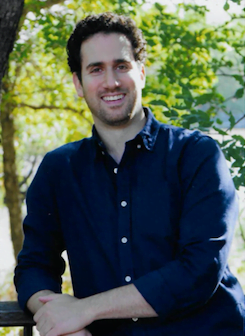
The opinions, facts and any media content presented do not necessarily reflect the position of B’nai Brith Canada.
Feb. 7, 2018
WINNIPEG – In honour of International Holocaust Remembrance Day on Jan. 27, 2018, B’nai Brith Canada came together in Winnipeg with the Canadian Museum for Human Rights and several community organizations to put on a free three-part series to mark the occasion, entitled Italy During the Fascist Era.
As Italy enters into the 2018 chairmanship of the International Holocaust Remembrance Alliance (IHRA), the events were themed towards the Italian experience with the Holocaust. They took place from January 28-30.
Joining B’nai Brith Canada were the Freeman Family Foundation Holocaust Education Centre of the Jewish Heritage Centre of Western Canada, the Canadian Museum for Human Rights, the Lupa Di Roma Branch of the Sons of Italy, Congregation Shaarey Zedek, the Dante Alighieri Society, the Italian Vice Consulate in Winnipeg, the Azrieli Foundation, and Holy Rosary Catholic Church.
B'nai Brith Canada was proud to help organize this insightful and informative presentation by @WesternU professor Dr. Alain Goldschläger in #Winnipeg this week, focusing on the life and times of Italian Jewish writer and #Holocaust survivor Primo Levi. pic.twitter.com/gkBqvRCrxg
— B'nai Brith Canada (@bnaibrithcanada) February 1, 2018
More than 160 people packed a classroom at the Museum to watch a screening of the Italian classic film The Garden of the Finzi-Continis, which portrayed the experiences of Jews in Fascist Italy and the consequences of the implementation of the Racial Laws. The film was followed by a discussion and Q&A with Dr. Jeremy Maron, the Museum’s curator for Holocaust and genocide content.
Dr. Alain Goldschlager, an expert on French language and literature and Shoah testimonials from the University of Western Ontario in London, gave an interesting talk on the work of Italian-Jewish Holocaust survivor and writer Primo Levi to about 200 attendees at Congregation Shaarey Zedek.
The third and final event was a discussion on the role of the Roman Catholic Church in the Holocaust, with specific attention to Pope Pius XI and Pope Pius XI. Although a serious topic, Father Sam Argenzanio of Holy Rosary Catholic Church, presented the matter in a compassionate and respectful manner, with a tasteful use of humour. His talk was well attended, with additional seats needed to accommodate the level of public interest, and was followed by a spirited Q&A and a wine and cheese reception.
The events were well received by the public, with many in attendance having come to all three presentations. The level of cooperation and coordination between the various co-sponsoring organizations, as well as the sophistication of the speakers and the audiences, made the series an intellectually stimulating enterprise, and demonstrated the significance that the subject of the Holocaust — and the importance of remembering and wrestling with that dark period in history — resonates deeply with the public.
In a time where all too frequently the Holocaust is minimized, trivialized, or denied outright, it is as imperative as it has ever been to bring people — from all walks of life — together to learn, share, and, of course, remember the Holocaust and pass on this history to future generations.
While updating important events in Winnipeg, it’s worth noting that, for the first time, the Gray Academy of Jewish Education invited schools from around the city to participate in its annual Raoul Wallenberg Day. The idea was the brainchild of Stephanie Kalo, Emily Kalo and Hannah Levit, who worked with their school teachers, administrators and various community organizations and activists to broaden the scope of this annual student-led event.
Raoul Wallenberg Day commemorates the courageous efforts of Raoul Wallenberg, a Swedish diplomat who provided many Hungarian Jews with passports. He created a network of safe havens that saved the Hungarian Jews from deportation to Nazi concentration camps. In Canada, he was granted honourary citizenship in 1985, and a postage stamp was issued in his honour in 2013.
This year’s Raoul Wallenberg Day at the Gray Academy of Jewish Education allowed many students who may otherwise have known very little about the important lifesaving work of this man to learn about his efforts, the Holocaust, as well as engage with other human-rights activists and learn about contemporary human-rights issues.
“The three of us are incredibly grateful for this experience, and we owe B’nai Brith an immense thank you for believing in us enough to help transform our idea into a reality,” Stephanie Kalo said. The three students were the successful applicants of B’nai Brith Canada – Midwest Region’s Human Rights Initiative Grant, which funds inspirational, creative and unique human rights projects.
The Grant is a project of B’nai Brith Canada’s League for Human Rights, as its falls in line with the League’s mandate to educate the public and engage the community on human-rights issues around the world. The Grant operates in the spirit of the Human Rights Code of Manitoba and the Universal Declaration of Human Rights, whereby the individual worth and dignity of all people is to be respected, valued and protected. It is open to all eligible applicants, regardless of their backgrounds.
B’nai Brith Canada – Midwest Region’s annual Human Rights Initiative Grant is accepting applications for this year. For more information, or to apply, please visit https://www.bnaibrith.ca/winnipeg. The deadline for applications is March 31, 2018.
Ran Ukashi is the Manitoba Regional Director for B’nai Brith Canada.


